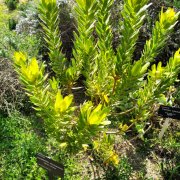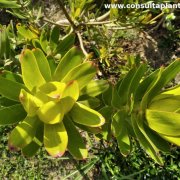Care of the shrub Leucadendron microcephalum or Oilbract conebush |
|
The genus Leucadendron, family Proteaceae, includes some 80 species of shrubs and trees native to South Africa. Some species are: Leucadendron microcephalum, Leucadendron eucalyptifolium, Leucadendron galpinii, Leucadendron discolor, Leucadendron meridianum, Leucadendron coniferum, Leucadendron xanthoconus. Common name: Oilbract conebush. Scientific synonym: Leucadendron stokoei. They are dioecious evergreen shrubs with a single branched stem that reach 1.5 meters (4.9 feet) in height (male plants) and 2 meters (6.56 feet) in height (female plants). The leaves are oblong and yellowish-green in color. The bracts of the female and male flowers are brown, oily, and sticky. They bloom in summer. Oilbract conebush is used in rockeries, on borders, to cover dry and sunny slopes, as isolated specimens and in pots for terraces and patios. It's ideal for Mediterranean coastal gardens. Leucadendron microcephalum needs full sun exposure and a Mediterranean climate. It resists occasional very light frosts. The soil can be normal garden soil with plenty of coarse sand to drain well. The planting is done at the beginning of spring or in autumn. Always water moderately, waiting for the substrate to be completely dry. Oilbract conebush resists drought well. Leucadendron microcephalum does not need fertilizers. Leucadendron stokoei can be pruned after flowering to keep them compact. Oilbract conebush is a resistant plant to the usual pests and diseases. Leucadendron microcephalum is propagated from seed sown in the nursery in the fall or spring and by cuttings (use rooting hormones). |
Images of the shrub Leucadendron microcephalum or Oilbract conebush |
Find plants
Leucadendron microcephalum or Oilbract conebush | Care and Growing
© 2026 FavThemes

